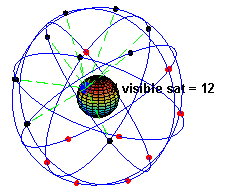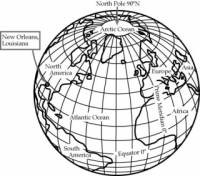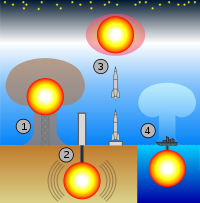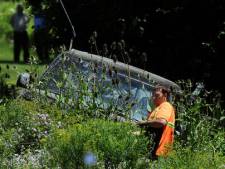What follows is the the first draft of my first cybersecurity thriller, The Alexandria Project. You can buy the final, and much revised eBook and printed versions, here and at all of the other usual on-line outlets.
 “What do you mean that Web site doesn’t exist? I’m looking at its log-in screen right now.”
“What do you mean that Web site doesn’t exist? I’m looking at its log-in screen right now.”
George Marchand was on the phone with the director of IT services at the U.S. Geological Survey.
“No it doesn’t George. You know what I’m saying.”
“I know you’re saying you know something you’re not telling me.”
“No, George. You know I’m saying I know something I can’t tell you. C’mon, be reasonable.”
“OK, have it your way. Then how about giving me a user ID and a password that don’t exist for this Web site that doesn’t exist?”
Bill Fine sighed. He’d known Marchand for years through inter-agency IT meetings and liked him. But he didn’t like him enough to end up fired or in jail.
“George, you know I can’t do that, either. But as I recall, you received the highest level access to the U.S.G.S. site for the interoperability/security pilot we’re running next week. Maybe you should spend a little time at the U.S.G.S. site in advance to get the lay of the land. Gotta go.”
Well how about that. George opened the locked cabinet in the corner of his office and removed a thick envelope. He sorted through the contents until he found another sealed envelope. In it was a set of log in instructions and two security tokens.
– 0000 – 0001 – 0010 – 0011 – 0100 – 0011 – 0010 – 0001 – 0000 –
“Number entered? OK, one last time, hit enter.” Then the phone line went dead.
Frank pressed the enter key, and a moment later he was inside the USGS site that didn’t exist. But what was it he was looking at?
A database, it seemed. And a big one, too. It must have hundreds of millions of individual data cells. He opened one up at random and found a pair of numbers, each ending in a letter – N and W. He checked a few other cells, and saw that one number ended in an “S.”
“What do N, W and S have in common?” he asked his father.
“Well, throw in an E, and you’ve got the four points of the compass.”
Of course – that must be it. These were geographic coordinates – latitude and longitude. And extremely precise ones at that. Instead of simply degrees and minutes – 38° 53’ N, 77° 02’ W, in the traditional presentation – the coordinates included much more exact information. These numbers displayed in decimal form, and to six significant digits, too. The number in the cell he’d opened looked like this:
42.495372N-70.85892W
Then he noticed something else that was strange. The last digit in the longitude number had just changed from 2 to 3. This wasn’t a database at all – it was the world’s largest spreadsheet. What was that all about?
He highlighted and copied the number for reference so he could check back later, and then began browsing through the administrative functions of the database. He found a field marked “search” and another marked “report,” so he pasted the coordinates he’d copied into the “report field.” He hit enter, and saw the following:
Abbot Hall, Marblehead, Mass.
Well, that was pretty accurate, he had to admit. There was a drop down menu next to the field, and he saw a number of options – distance from Washington, D.C., distance from a field he could fill in, and so on. He tried distance from Washington, and saw:
296.47524
That must be a direct line distance in miles. Not too useful for driving.
“So what did you find?”
“Give me another minute.” He didn’t want to spend any more time on the site than absolutely necessary. Since this whole mad saga had begun, he hadn’t done anything illegal, no matter what the FBI might think. Given the source of the log in information he might not even be breaking the law now. But if he started downloading anything from the site, he’d have to be violating who knows how many more laws. This had better end well.
He finished setting up the download and initiated the transfer. Then he turned back to his father.
“It looks like a database of geo-coordinates. Hundreds of millions of them. What do you make of that?”
 “Well, at the degree and minute level, there’s only so many coordinates you could have – you’ve only got 360 degrees of latitude and longitude to work with, and 60 minutes per degree. So they must be calculating locations a lot finer than that.
“Well, at the degree and minute level, there’s only so many coordinates you could have – you’ve only got 360 degrees of latitude and longitude to work with, and 60 minutes per degree. So they must be calculating locations a lot finer than that.
“So let me see…a minute of latitude is 1.15 miles, and a minute of longitude can be a lot less than that, since longitudinal lines converge at the poles. When you get down to a 60th of a minute – a second of latitude or longitude – you’re talking about a maximum of maybe 100 feet. So if you’re looking at hundreds of millions of coordinates, you’re probably looking at a database of the coordinates accurate to within a couple of feet.”
Frank nodded. “You’re right. And there’s another thing you should know. The database isn’t static, it’s live. The last digit of one of the numbers changed as I was looking at it. I guess GPS satellites must have a margin for error.”
His father shook his head. “Nope. That doesn’t make sense. Sure, the satellites would have a margin of error, but the earth’s surface doesn’t. There’s no sense changing coordinates around for places that aren’t actually moving. What you’d want to do would be to set up your database software to average out the data downloaded from say a half dozen orbits and then fix the numbers for good. There’s got to be another explanation.”
They mulled that one over for a while but got nowhere.
“OK, so let’s try another tack.” Frank Sr. suggested. “What’s so special about this particular database of geographical coordinates? I’ve got one loaded in this GPS unit on my dashboard. If we could figure that out, we’d probably know why it’s been hacked.”
“Well, I can think of a few reasons. First, even if the data isn’t more accurate, it looks like they wanted this set to be a whole lot more secure. That way they wouldn’t have to worry about any of the data being corrupted or tampered with. Second, they might want to be sure that it was available when they needed it, so whoever has access to this particular database may have a hardened link in. That way they can get to it when they need it, and not have it jammed in transit. Both of those factors suggest a military use.”
“Makes sense so far.”
“The really intriguing part, though, is the dynamic aspect. The military can afford to include high density data storage in whatever they want, so why do they need to have remote access to a database of geo-coordinates at all? It must be because this one is changing, rather than fixed in memory, like the one in your GPS.”
“So we’re back to the same question, right? Why is it changing, and why does it matter”
“Yeah. But how about this: if you’re going somewhere, you not only need to know the coordinates of where you’re going, but also the coordinates of where you are. Otherwise, you can’t calculate what direction to go in, or how far you need to go before you get there. Maybe this has something to do with where you are, and not your destination.”
“That’s not sounding right to me. That’s what the GPS satellites are for. Wherever you are, you just lock on to them, and your GPS unit calculates your location by triangulation, using the length of time it takes the signals to reach it from three different satellites. The only thing it’s using its internal database for is to display streets and such after it figures out where it is. So as long as you’ve got the satellites, you never need a database of coordinates to tell you where you are at all.”
“Maybe that’s the key then. When might you need to know your location when the satellites weren’t available?”
“Well, they could be shot down. But there’s 24 of them, and anyway only a very few countries on earth have the ability to shoot one down. I suppose you could jam them, at least in theory. But if someone tried to I assume we could pinpoint the source of the signal, and then take it out. Any way you look at it, if anyone tried to shoot down or jam the GPS satellite system, I have to believe we’d be in the middle of an all-out nuclear war.”
“OK, so let’s say that’s the case. Let’s assume this database has something to do with nuclear defense capabilities. That sounds plausible – it’s high enough stakes to justify all the hullabaloo the bad guys have engaged in to keep us from focusing on it, right?”
But his father didn’t answer. Instead, he was looking intently at his rear-view mirror.
– 0000 – 0001 – 0010 – 0011 – 0100 – 0011 – 0010 – 0001 – 0000 –
Vice President Chaseman rose to welcome the Secretary of State into the Oval Office.
“Good to see you, Jim. Have a seat.”
 As he walked in, James Rauschenberg tried to see as much of the Oval Office as he could without seeming obvious. He thought that it was remarkably poor form for Chaseman to be sitting at the President’s desk at all. Hopefully Rawlings would be back in command, albeit from his hospital bed, within a couple of days – his quadruple bypass surgery had gone well, thank God. At least Chaseman hadn’t replaced the President’s pictures on the wall with his own.
As he walked in, James Rauschenberg tried to see as much of the Oval Office as he could without seeming obvious. He thought that it was remarkably poor form for Chaseman to be sitting at the President’s desk at all. Hopefully Rawlings would be back in command, albeit from his hospital bed, within a couple of days – his quadruple bypass surgery had gone well, thank God. At least Chaseman hadn’t replaced the President’s pictures on the wall with his own.
“Good to see you too, Sir. I assume the topic is North Korea?”
“Pretty safe bet, given that they’ve commenced fueling those missiles. Anyway, the answer is yes. More specifically, I’d like you to alert our closest allies of the steps the United States will take if North Korea launches those missiles.”
“Steps, Mr. President? I wasn’t aware that you had already reached consensus with the National Security Counsel and the Joint Chiefs of Staff on an appropriate course of action?”
Chaseman gave a tight smile and leaned forward.
“That’s right, Jim, I haven’t. And I don’t plan to, either.”
“Excuse me, Sir?”
“Tell me what section of the Constitution requires that kind of powwow? As I recall, the Joint Chiefs of Staff and the Security Counsel didn’t exist until the Founding Fathers were long gone.”
“But Sir…”
“Don’t ‘But Sir! me!’” You know that Rawlings was worried about having a heart attack or stroke. I may have my differences with him on other questions, but he did the right thing on this one.
“As soon as he took office, he had the required letters drawn up to convey the powers of Acting President to me immediately in case he was incapacitated. Those letters have been delivered to the Speaker of the House and the Speaker Pro Tem of the Senate and can’t be revoked except by the President himself.
“Until he does, I’m the Commander in Chief, and I’m determined to act in that capacity. Now listen carefully.”
Rauschenberg sat straight up in his chair, dreading what he was about to hear.
“Here’s what you are going to say: if even one North Korean missile enters U.S. air space, we will immediately deliver, through a means of our choosing, one strategic nuclear weapon over Pyongyang and then trigger that device. If a second missile reaches our airspace, we will deliver a second warhead to a second target, which will remain unnamed. That device will be triggered as well.”
Rauschenberg said nothing. This was not only nuclear madness, but a terrible strategy as well – why commit ourselves to a game of chicken that might not work?
“I assume that you have heard me accurately, so I will continue. You will deliver this message personally by secure telephone to the British, the Russians, the Japanese and the Chinese.”
“The Chinese, Sir? Not the Germans or the Canadians or the French?”
“Are the Germans or the Canadians or the French likely to contact Jong-Il?”
“No Sir, I should think not.”
“Do you expect the Chinese will?”
“Yes Sir, of course they will.”
“Good. Then I assume you understand my plan. You’d better get started. We’ve got less than 12 hours to work with.”
Rauschenberg started to say “But” and caught himself just in time. “You’re assuming that if the North Korean’s get word of our plans that they’ll back down?”
“That’s right.”
“But what if they don’t believe us? What if they call our bluff?”
“Of course they’ll believe us! If we delivered such a threat and didn’t follow through the credibility of our nuclear deterrent forces would be destroyed forever! Even Jong-Il isn’t crazy enough to miss that. If he knows we won’t back down, then he’ll have to. And he’ll stay backed down, assuming he can hang on to power after being humiliated in front of his generals. I’m assuming he won’t, which is the second part of the plan.”
Rauschenberg couldn’t think of another word to start with this time. “But Sir – a nuclear weapon? The whole world will condemn us! You’ll have the blood of millions of innocent people on your hands!”
“I believe I covered that point thoroughly during our last Security Council meeting, Rauschenberg. The nuclear taboo has served its purpose. I’m prepared to move on.”
 The Secretary tried to think quickly; what else could he say that might cause Chaseman to abandon his reckless strategy? Short of a refusal by the military to obey orders, there was no other way to stop him. And what General would refuse a direct order from the Commander in Chief while a nuclear armed missile was headed towards the U.S.? Rauschenberg tried the last argument he could think of.
The Secretary tried to think quickly; what else could he say that might cause Chaseman to abandon his reckless strategy? Short of a refusal by the military to obey orders, there was no other way to stop him. And what General would refuse a direct order from the Commander in Chief while a nuclear armed missile was headed towards the U.S.? Rauschenberg tried the last argument he could think of.
“Assuming this works, Sir, and the North Koreans back down. What will happen the next time? Unless we’re willing to make the same threat every time someone takes us to the wall, we’ll have destroyed the credibility of our nuclear deterrence capability anyway. President Rawlings may be back in charge again as soon as the day after tomorrow, and you know very well that he would never want to follow such a policy if there was an alternative. Do you really want to tie his hands that way?”
As he listened to his own argument, Rauschenberg’s last hopes crumbled. He already knew what Chaseman’s answer would be.
“You’re absolutely right! Before his unfortunate medical episode, Rawlings never would have pursued such a strategy. But by the time he comes back, he’ll have no choice. When you’re only an Acting President, Rauschenberg, you have to work fast.”
– 0000 – 0001 – 0010 – 0011 – 0100 – 0011 – 0010 – 0001 – 0000 –
Frank looked over at his father. “What’s up?”
“We’ve got company. See that black Lincoln Town Car up ahead? You’ll notice that it’s slowed down so cars will start passing it. Up until a few minutes ago, it was staying exactly five cars ahead of us. Now borrow my rear view mirror, and you’ll see a gray Ford Crown Victoria slowly moving up on us.”
“How can you be sure they’re after us?”
“Fifteen minutes ago a State Trooper was coming up fast in the passing lane, until he noticed us. Then he started coasting, and when he pulled level, he took a quick glance in my direction. Soon as he had, he took off again.
“So the FBI must have figured out we’re not dead – yet – and put out an all points bulletin for a geezer in an old, light-green Land Rover. No surprise to me the Town Car and the Victoria showed up just a few minutes ago, both at once.”
“Why didn’t the Trooper just pull us over?”
“I’m betting the FBI is taking no chances this time. If the Staties pick us up, the word will get out. But if the FBI does the job, the CIA will never know we’ve been grabbed.
“Here’s what you’re watching: in a couple of minutes, the black car will be directly ahead of us, and the gray one will move up in the passing lane till its right next to me, going the same speed. Once we’re boxed in, except to the right, the guy in the passing lane will show his ID to me through his window. With that, they’ll start to drift right and slow down. We’ll have no choice but to do the same – the guy ahead won’t be shy about braking till our bumpers touch, if he has to, and then start applying his brakes.
“Once they’ve got us stopped on the shoulder, they’ll pop us in one of the cars, and just leave ours where it is. All very inconspicuous when you do it right and the target doesn’t do anything stupid. Now let me concentrate.”
Frank watched nervously as his father continued to drive. Then he casually pulled into the passing lane and slowly passed the car in front of them, and then another. As he did, the black Town Car up ahead pulled into the middle lane to maintain position, and the gray car behind quit moving closer. When he returned to the middle lane, the gray car started creeping forward again, and once again his father started passing. The third time he stayed in the passing lane for awhile, not returning to the middle lane until he was a few cars behind two tractor trailers just starting the climb up a long upgrade. There was now only one car between theirs and the gray Victoria.
Almost immediately, the big rigs began to lose speed, and the two cars in front of the Land Rover entered the passing lane. Frank’s father followed. What was he up to, Frank wondered?
When they were even with the gap between the trucks, his father finally made his move. He wrenched the wheel to the right, shot through the gap and continued across the right hand lane. Then he slammed on the brakes and manhandled the skidding vehicle across the breakdown lane. Moments after he had begun the maneuver, they were hurtling down the grassy margin of the highway and into the six-foot high weeds of an abandoned farm. By the time the two FBI cars got clear of the tractor trailers, it would seem as if the Rover had disappeared off the face of the earth.
Frank was thrown forward against his seat belt and then from side to side as the car rocked and swerved. As the car sped across the field, he realized he was holding his breath, and exhaled loudly. “You skipped the part about becoming a wheel man for the Mafia when you brought me up to date.”
His father was looking pleased. “What’s the use of having an off-road vehicle if you don’t go off-road every now and then?”
 By now, the car was going more slowly, bumping over the remnant furrows of what must have been a cornfield only a year or two before; here and there, tall, dry cornstalks stood, sprouted from the kernels that had escaped the farmer’s last harvest. Like the goldenrod and the enormous weeds that surrounded them, they disappeared under the front bumper of the Rover and then struggled half-upright again after they passed.
By now, the car was going more slowly, bumping over the remnant furrows of what must have been a cornfield only a year or two before; here and there, tall, dry cornstalks stood, sprouted from the kernels that had escaped the farmer’s last harvest. Like the goldenrod and the enormous weeds that surrounded them, they disappeared under the front bumper of the Rover and then struggled half-upright again after they passed.
Not long after, they emerged onto a curving dirt road. Frank Sr. glanced up at the sun, and turned away from it, heading east. As they drove on, other dirt roads crossed their own, and street signs marked the intersections. They must be in a housing development gone bust with the recession.
“Ha!” Frank’s father snorted: “‘Cheney Way!’ And there’s ‘Rumsfeld Road.’ Looks like this couldn’t have happened to a nicer developer.”
They continued heading east as much as possible for another few minutes, looking for a way out of the enormous field of weeds, lanes and cul-de-sacs. Just before they crossed Bush Boulevard, though, the black Town car shot across just ahead of them. Its driver slammed on the brakes at the same instant his father downshifted and floored the Land Rover.
“Damn! That didn’t take long enough. They’ll be all over us in no time – this thing isn’t built for speed. Hold on.”
Frank did very much as he was told, as the Rover spat gravel and hurtled forwards. But in no time, the black Town Car was closing on them fast, and as new cross streets flickered by, they could see the gray Victoria racing along on a road parallel to their own. This was beginning to feel familiar.
“Here – steer.”
“What!!?!?” Frank screamed. But his father was already half out of the car, standing on the driver’s seat and craning his head around several feet above the roof of the cab. Frank clenched the wheel with both hands, trying to keep the car from swerving.
“Got it,” his father said as he slid back into the driver’s seat. Slamming on the brakes just before the next cross street, he cornered onto it on two wheels, then struggled to straighten the vehicle out once again.
“Where are we going now?” Frank asked, eye’s wide and looking behind them.
“Generally or specifically?” his father asked, hunched over the wheel. Behind them, Frank could already see the dust of the Town Car closing in on them once again.
“How about specifically?”
“No clue.”
“Okay, okay – generally then?”
“Not too sure on that, either, but I’ll know it when we get there. For starters, though, it’s some woods I saw over this way. Town Cars don’t get along with woods at all, but this Land Rover’s pretty friendly with them.”
Now Frank could also see trees, rising straight ahead above the weeds and cornstalks. But the black Town Car was only a few car lengths behind.
Swooping around a last curve, Frank was bracing himself for another sharp turn onto what he hoped would be a dirt road paralleling the tree line. And then he saw it – the gray Victoria, stopped broadside dead ahead. An FBI agent stood at either end, handgun drawn and aimed in their direction.
“Duck!” his father yelled, simultaneously throwing himself down and to the right while wrenching the wheel in the same direction. Frank heard the zing of a bullet as it clipped the rear of the car just before they hurtled into the weeds.
 Corncobs and weed stalks flew in every direction as his father struggled with the wheel. But from behind came a highly pleasing medley of the sounds of rending metal as the two cars for a brief moment became one, and then disincorporated into an impressive array of flying metal and glass.
Corncobs and weed stalks flew in every direction as his father struggled with the wheel. But from behind came a highly pleasing medley of the sounds of rending metal as the two cars for a brief moment became one, and then disincorporated into an impressive array of flying metal and glass.
Breathing heavily, his father steered onto the dirt road between the weeds and the woods and drove more slowly, scanning the woods to the side. “We’ve got to get out of here. Even if there aren’t any more cars on our tail right now, they’ll probably have a helicopter on the way when one of those guys radios in.”
A few minutes later, Frank Sr. saw what he was looking for – a small stream running in a culvert under the road. He slowed to a crawl when he reached it, and gingerly turned the vehicle off the dirt road and into the stream. Putting it in neutral, he jumped out and dragged a large branch a few times over the dirt and grass where they had turned off the road.
“Hopefully they won’t notice we left the road there.” He climbed back in and began guiding the Rover down the gently flowing stream, working it over the rocks and branches that littered the streambed. New leaves of spring intermixed overhead, largely blocking them from aerial view. Things had suddenly become gratefully peaceful as they lurched their way slowly through the sun-dappled forest of spring.
“Now what?” Frank asked.
“Well, that’s it for roads. They know where they last saw us, so every cop in Maryland is going to be on the lookout. Fire up your laptop and open up Google Earth, and we’ll see where we should head to next.”
Frank booted up and zeroed in on their approximate location. “Where are we?”
His father glanced at his GPS and gave him the coordinates.
“Isn’t there a long park that comes into D.C. from the north?” Frank Sr. asked.
“You mean Rock Creek?”
“That sounds right. Look for that.”
“Got it. The stream that runs through it empties into the Potomac just west of the White House.”
“Perfect. Now follow it back north. How far does it go?”
“I don’t know about that park, but it looks like it links into a green corridor that winds around but generally heads north for miles – well beyond the Beltway.”
“That’ll do. Any chance this stream crosses it?”
Frank dragged the image around on his laptop, watching the coordinates change and comparing them to their position.
“Matter of fact, we’re less than half a mile away from it. Once we intersect, it looks like there should be enough fire lines, service roads and park lanes to get us all the way into town. We’ll have to cross a real road from time to time, but we shouldn’t have to travel on one.”
They continued on their winding way until they saw a bridge ahead where a secondary road crossed the stream. As they drew closer, they could see open fields just past the bridge that stretched away to the north and south, bordered by trees on both sides.
Frank Sr. drove the Land Rover under the bridge and stopped next to a sandbank. “Nobody’s going to see us down here. Better wait for dark before we go any further.”
 Frank got out of the vehicle and stretched gratefully. Then he noticed a young boy, maybe 11 years old, looking at them from beside the stream up ahead. Frank nodded in the boy’s direction to his father as he got out of the driver’s seat.
Frank got out of the vehicle and stretched gratefully. Then he noticed a young boy, maybe 11 years old, looking at them from beside the stream up ahead. Frank nodded in the boy’s direction to his father as he got out of the driver’s seat.
His father studied on the situation for a moment, and then said. “Howdy, son. Fish’n?”
“No, mister. Just hanging out.”
Frank’s father nodded. The boy continued to stare.
“How come you’re driving your car in the creek, Mister?” the boy asked.
Frank Sr. mulled that over for a little while, and then pointed at the full moon that was just beginning to rise.
“Werewolves can’t stand water.”
The boy’s eyes grew as round as the rising moon. Then he scampered over the bank of the stream and disappeared.
 “What do you mean that Web site doesn’t exist? I’m looking at its log-in screen right now.”
“What do you mean that Web site doesn’t exist? I’m looking at its log-in screen right now.” “Well, at the degree and minute level, there’s only so many coordinates you could have – you’ve only got 360 degrees of latitude and longitude to work with, and 60 minutes per degree. So they must be calculating locations a lot finer than that.
“Well, at the degree and minute level, there’s only so many coordinates you could have – you’ve only got 360 degrees of latitude and longitude to work with, and 60 minutes per degree. So they must be calculating locations a lot finer than that. As he walked in, James Rauschenberg tried to see as much of the Oval Office as he could without seeming obvious. He thought that it was remarkably poor form for Chaseman to be sitting at the President’s desk at all. Hopefully Rawlings would be back in command, albeit from his hospital bed, within a couple of days – his quadruple bypass surgery had gone well, thank God. At least Chaseman hadn’t replaced the President’s pictures on the wall with his own.
As he walked in, James Rauschenberg tried to see as much of the Oval Office as he could without seeming obvious. He thought that it was remarkably poor form for Chaseman to be sitting at the President’s desk at all. Hopefully Rawlings would be back in command, albeit from his hospital bed, within a couple of days – his quadruple bypass surgery had gone well, thank God. At least Chaseman hadn’t replaced the President’s pictures on the wall with his own. The Secretary tried to think quickly; what else could he say that might cause Chaseman to abandon his reckless strategy? Short of a refusal by the military to obey orders, there was no other way to stop him. And what General would refuse a direct order from the Commander in Chief while a nuclear armed missile was headed towards the U.S.? Rauschenberg tried the last argument he could think of.
The Secretary tried to think quickly; what else could he say that might cause Chaseman to abandon his reckless strategy? Short of a refusal by the military to obey orders, there was no other way to stop him. And what General would refuse a direct order from the Commander in Chief while a nuclear armed missile was headed towards the U.S.? Rauschenberg tried the last argument he could think of. By now, the car was going more slowly, bumping over the remnant furrows of what must have been a cornfield only a year or two before; here and there, tall, dry cornstalks stood, sprouted from the kernels that had escaped the farmer’s last harvest. Like the goldenrod and the enormous weeds that surrounded them, they disappeared under the front bumper of the Rover and then struggled half-upright again after they passed.
By now, the car was going more slowly, bumping over the remnant furrows of what must have been a cornfield only a year or two before; here and there, tall, dry cornstalks stood, sprouted from the kernels that had escaped the farmer’s last harvest. Like the goldenrod and the enormous weeds that surrounded them, they disappeared under the front bumper of the Rover and then struggled half-upright again after they passed. Corncobs and weed stalks flew in every direction as his father struggled with the wheel. But from behind came a highly pleasing medley of the sounds of rending metal as the two cars for a brief moment became one, and then disincorporated into an impressive array of flying metal and glass.
Corncobs and weed stalks flew in every direction as his father struggled with the wheel. But from behind came a highly pleasing medley of the sounds of rending metal as the two cars for a brief moment became one, and then disincorporated into an impressive array of flying metal and glass.  Frank got out of the vehicle and stretched gratefully. Then he noticed a young boy, maybe 11 years old, looking at them from beside the stream up ahead. Frank nodded in the boy’s direction to his father as he got out of the driver’s seat.
Frank got out of the vehicle and stretched gratefully. Then he noticed a young boy, maybe 11 years old, looking at them from beside the stream up ahead. Frank nodded in the boy’s direction to his father as he got out of the driver’s seat.
I was trying to take us all the way to the end, but the chapter kept getting longer and longer. Next week may be the last chapter, so stay tuned.
– Andy
Sorry to be a pain, but I don’t like or understand the following sentence: "Then he slammed on the brakes and manhandled the skidding vehicle crossed the breakdown lane." Should ‘crossed’ be ‘crossing’ or ‘and crossed’?
PS: What am I going to look forward to on Monday evenings (this side of the pond) when this epic comes to an end? Perhaps I can propose a law suit for Earl Jenkins vs. the FBI and/or CIA for destroying his EarthRoamer … I am sure that SCO and BS&F can keep help keep that going for a further 29 chapters and 7 years of your time! Then we’ve got to track down Mrs. Foomjoy, and I am still trying to ascertain why I googled for the lyrics of ‘a little help from my friends’ a couple of months ago – unless it related to Frank’s friend who helped create the iBallzapper! game??
Minrich,
Never a pain – thanks for catching that. It should have been "across" rather than "crossed." As to your PS questions:
>What am I going to look forward to on Monday evenings (this side of the pond) when this epic comes to an end?
That’s one I can’t answer, but I can give you some peripheral details. I had hoped to take the story to a conclusion this week, but not only did I run out of time, but I ran out of space (one of the strange things about Geeklog are the built in constraints that you don’t know about – such as permitted text length. Plus the fact that all you get is an error message when you hit one – no explanation of what the problem was.
Anyway, unless I run into the same problem again, the active part of the story should indeed come to an end next week, with a "tie up the loose ends" epilogue the week following – and then the book will indeed be at an end.
After that, I’ll take a bit of a rest and then go back to the beginning and start editing. While I had a general idea about where the book was going to go, most of it, beyond the broad brush strokes, evolved over time. So I’ve got to go back to the beginning and not only make it better, but also clean things up. For example, it might be better if I began the story a few months later. The only reason it began where it did, in fact, was because I set the first scene at a holiday party. Kind of the tail wagging the dog.
Another thing I need to do is go back and double check the personal timelines of the Adversego familly. It’s pretty solid, but may need some fixing here and there. The constraints for that one included (a) needing an approprirate period for Frank’s second generation immigrant parents to grow up; (b) an appropriate time slot for Frank Sr.s military service; while (d) still sending Frank Jr. off to MIT at an appropriate time during the evolution of the computer; and so on.
Can you look forward to a sequel, or a new set of characters in another book? Probably not for a while, or maybe ever. Setting myself the requirement of turning out 3 – 5,000 words a week on top of a more than full time job and a family proved to be pretty taxing, taking up an average of 8 – 12 hours, pretty much eradicating weekends. It also meant doing almost no blogging on other topics. It will be good to have a break for awhile. On the other hand, if I had not committed myself to kick out a chapter a week, I might never have gotten it written at all.
>Perhaps I can propose a law suit for Earl Jenkins vs. the FBI and/or CIA for destroying his EarthRoamer … I am sure that SCO and BS&F can keep help keep that going for a further 29 chapters and 7 years of your time!
An excellent suggestion!
>Then we’ve got to track down Mrs. Foomjoy
Indeed, we can’t leave her (or perhaps in fact it was a him?) on the loose.
>I am still trying to ascertain why I googled for the lyrics of ‘a little help from my friends’ a couple of months ago – unless it related to Frank’s friend who helped create the iBallzapper! game??
Not quite; this was a forward reference to the next chapters, in which Frank enlists the power of crowd sourcing to help track down (what turns out to be ) Mrs. Foomjoy. It was also kind an inside tip of the hat to Winter for a comment he offered to Chapter 7, where he wrote;
"Now he met a challenge that he cannot handle alone. He is to realize shortly, that security is something you have to build together with others. You might be able to build a castle on your own. But any castle is worthless without people to defend it."
The link should have taken to you to an audio clip of the Beatles’ classic.
So you can look forward to at least two more cozy evenings with the electronic reading device of your choice. After that, we’ll just have to wait and see.
Best,
– Andy